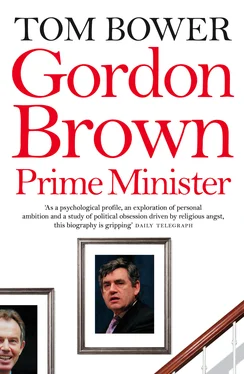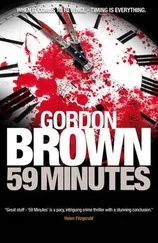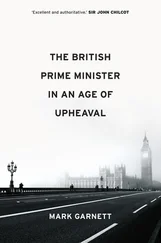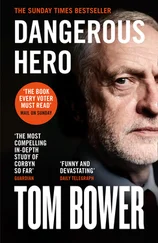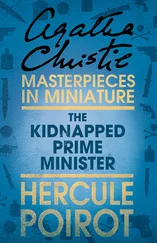‘Hello, I’m Gordon Brown,’ smiled the chancellor as Cathy Waterworth opened the door. ‘I’m so grateful that you’ll have us,’ he said, leading thirteen people into the flat before his putative hosts could have second thoughts. Geoffrey Robinson immediately assumed the role of waiter, ferrying bottles of Peroni beer from the fridge at the far end of the flat to the chancellor, already hunched up close to the television, revealing the handicap of his single eye. Preoccupied, Brown uttered only a few comments throughout the match. At half-time he disappeared to be interviewed by a journalist for Monday’s newspaper. Robinson used the opportunity to look at Waterworth’s oil paintings. ‘My father’s the artist,’ explained the host. ‘Would you sell me that one?’ asked the paymaster general. The doorbell rang. A journalist returned with a bunch of flowers for Cathy. When the second half started, Robinson resumed his duties as waiter, and as Scotland’s 2–0 victory seemed assured, the atmosphere became light-hearted. ‘Great,’ announced Brown at the end. After more jokes, he bade farewell. He looked forward to the live match later that night.
The next stop was the British embassy. ‘I wonder how much we’d get if we flogged this lot,’ chortled Whelan in his south London accent as they walked into the marbled, ornately furnished building. The chancellor smiled at the joke directed at Robin Cook, the foreign secretary, one of Labour’s tribe whom Brown, during his fraught journey up the party’s hierarchy, had grown to loathe. They were joined by Stuart Higgins, the editor of the Sun , Tony Banks, the minister for sport, and Jack Cunningham, the minister of agriculture. Neither of the politicians was a ‘Brownite’, and their politeness towards the chancellor was noticeably diplomatic. Standing in the corner was Sir Nigel Wicks, the Treasury’s second permanent secretary. ‘Are you going to the match?’ Wicks was asked. ‘No,’ he replied hesitantly. ‘Why?’ ‘Prudence.’ ‘What?’ ‘I’m here on business, and I would not want my presence in Rome to be misinterpreted.’ The Treasury, some speculated, had contrived the visit to the Italian finance minister as a fig leaf to justify the junket. The final guest, the genial former Manchester United star Bobby Charlton, was uniquely guaranteed Brown’s affection.
Relationships were important to Gordon Brown. His unswerving loyalty to family and friends had marked him as a clan chieftain. The admiration and love he attracted was contrasted with his ferocious hatred of others. ‘Peter Mandelson is in Rome,’ the ambassador told Brown while the champagne was poured. ‘But he returned to London rather than watch the match.’ The chancellor’s relief was unconcealed. His fraught relationship with his former friend was a source of widespread gossip.
The brief visit to the embassy mirrored the conflicts of interest, personalities and policies swirling around every nuance of the chancellor’s hectic life. Just as renowned as his intelligence, education and shrewdness were his vendettas. ‘Never hate your enemies,’ said Michael Corleone, the son of Mario Puzo’s Godfather. ‘It affects your judgement.’ Gordon Brown ignored that advice, but did embrace Corleone’s confession to his lawyer: ‘I don’t feel I have to wipe everybody out, Tom. Just my enemies.’ Surrounded by his intimates, the Godfather expected loyalty and obedience towards himself. Those who thwarted his ambitions were despised and occasionally destroyed. His justification was faultless: his beloved party and his ambition required submission to his agenda. In return for his trust, his ‘family’ honoured his requirements.
Driving in a minibus from the embassy past the Colosseum, the home of bloody gladiatorial contests, towards Rome’s Olympic stadium for the football match, the chancellor might have reflected upon the ancient building’s symbolism. Two thousand years earlier, only the fittest survived, and even at the moment of glory, the bloodied victor could be ravaged by the spectators’ dissatisfaction. His party’s antics back home resembled ancient Rome’s lack of generosity. The pernicious undercurrents in Westminster often turned friend into foe. Over the years, Gordon Brown had accumulated many enemies. To win the ultimate prize required a new strategy. Inviting the journalists to Rome was another step to win favour for his inheritance of the premiership.
At the stadium, Brown was seated with Carlo Azeglio Chamoi. The match was enjoyable but by the end at 10.45 p.m., both were disappointed by the goalless draw. Gazing down from the directors’ box, Brown watched as Italy’s supporters and some of the 16,000 England fans began fighting. With drawn batons the police were charging the Britons. Patiently, Brown waited for two hours in the minibus until the six journalists could leave the stadium. Robinson had fretted that his reservation at Harry’s Bar for a lobster and champagne dinner would be cancelled, but the famous restaurant loyally waited for the party, as did the soprano hired to sing for them. The bill for the enjoyable dinner was paid by Robinson.
After the group’s return to London, the trip attracted some curiosity. For a time the presence of the journalists with the chancellor was suppressed by some newspapers, and when, seven weeks later, Geoffrey Robinson became embroiled in a scandal about his financial dependence on an offshore tax haven, some of those journalists who had accepted his hospitality were inclined to vouch for his probity. Consumed by self-righteousness, Gordon Brown disparaged those criticising his paymaster, and steadfastly resisted any public admission of Robinson’s wrongdoing. Concessions, he knew, signalled weakness. Thanks to Brown’s support, Robinson would survive the first accusations of sleaze. But the lifebelt caused many to puzzle about the chancellor’s psychology. His defiance was forged, some suggested, during his Scottish childhood in order to camouflage his spiritual torment. Others speculated why one character simultaneously aroused extremes of sympathy and outrage. Gordon Brown himself volunteered few clues. Incapable of self-analysis, he zealously sought to prevent outsiders from penetrating the origins of and reasons for his emotions. An unmentioned spirituality certainly lurked among the foundations of his life. The possibility of entering the priesthood had never featured among his ambitions, yet the conflict between good and evil had dominated his formative years. The mystery was his journey from his childhood credo of God and love to the less forgiving characteristics that would dominate his adulthood. His ostensible compassion for humanity confused the search for clues about that transition yet bequeathed the riddle: Gordon Brown, saint or sinner?
The stench of linseed oil and coal drifting up the hill obliterated the salty odour of the cold sea waves crashing just four hundred yards from his family’s large stone house. Two linoleum factories were part of Kirkcaldy’s lifeblood, just as the small town’s financial survival relied upon the local coalmines. Both were dying industries, threatening new unemployment in the neighbourhood. The men of Fife profess to be self-contained, but are vulnerable to their environment. Kirkcaldy’s stench, grime and decay shaped Gordon Brown’s attitude towards the world.
Kirkcaldy in the 1950s could have been a thousand miles from Edinburgh, although the elegant capital lay just across the Firth of Forth. Gordon Brown’s home town was shabby, and the townspeople were not a particularly united community. John Brown, his father, the minister at St Brycedale Presbyterian church, struggled unsuccessfully to retain his congregation. Some had permanently renounced the Church, while others had moved to the suburbs, abandoning the less fortunate in the town. Outsiders would have discovered nothing exceptional about John Brown’s ministry in Kirkcaldy’s largest church. His status was principally attractive to those at the bottom of the heap, who called regularly at Brown’s rectory – or manse – for help. The preacher of the virtues of charity was willing to feed the hungry, give money to those pleading poverty, and tend the sick. Some would smile that John Brown was an unworldly soft touch, giving to the undeserving, but his generosity contrasted favourably with Fife’s local leaders. There was little to commend about the councillors’ failure to build an adequate sea wall to protect the town from the spring tides of 1957 and 1958. During the floods, young Gordon Brown helped his father and his two brothers distribute blankets and food to the victims, proud that his father became renowned as a dedicated, social priest. ‘Father,’ he later said, ‘was a generous person and made us aware of poverty and illness.’ The dozens of regular callers at the house pleading for help persuaded Brown of the virtues of Christian socialism, meaning service to the community and helping people realise their potential. Living in a manse, he related, ‘You find out quickly about life and death and the meaning of poverty, injustice and unemployment.’ The result was a schoolboy bursting to assuage his moral indignation.
Читать дальше
